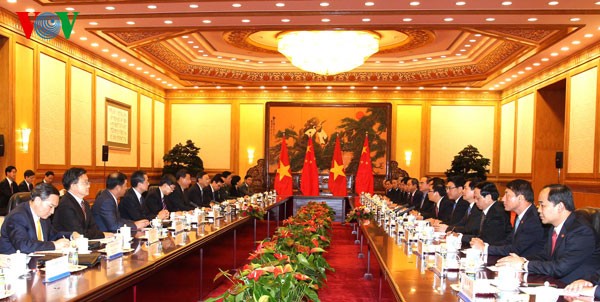(VOVworld)- Vietnamese President Truong Tan Sang arrived in Hanoi on Friday successfully concluding his state visit to China at the invitation of the General Secretary of the Communist Party of China and President Xi Jinping. During the visit, the two sides signed several political and cooperation agreements paving the way for furthering Vietnam-China relation.
 |
During talks with visiting Vietnamese President Truong Tan Sang, Chinese President Xi Jinping affirmed that China treasured cooperation and friendship with Vietnam emphasizing that the traditional friendship cooperation fostered by the two countries’ predecessors is the valuable asset that both Parties and States need to continue and develop. President Sang affirmed Vietnam’s long standing and consistent policy of respecting the friendly neighborliness and comprehensive strategic cooperation with China. Vietnam is ready to work the Chinese Party, State and people to elevate the Vietnam-Chinese comprehensive strategic partnership to a new height. During the talks, the two Presidents agreed to further deepen the mutual political trust between the two Parties and States by different means including increasing high-ranking visit exchanges and effectively implementing signed programs and agreements.
Cooperation in economic and trade development between Vietnam and China was one of the highlights of President Sang’s visit to China. 10 agreements, action programs, framework agreements and cooperation plans were signed after the two Presidents’ talks. These agreements created a motivation to further bilateral ties. In the 4th amendment to the agreement between the Vietnam National Oil and Gas Group (PVN) and the China National Offshore Oil Corporation (CNOOC) on joint offshore exploration in the Gulf of Tonkin, Vietnam and China agreed to conduct oil and gas exploitation in the Tokin Gulf’s sea areas within the demarcation line of the two nations. Vietnam’s Ministry of Agriculture and Rural Development and its Chinese counterpart agreed to set up a hotline on unexpected incidences in fishing operations at sea. The 10 agreements signed on this occasion opened new prospects for the two countries to strengthen cooperation in economics, trade, culture, sports, tourism, health care, science and technology. Particularly, agreements on trade and economic cooperation will enable the two countries to ensure stable growth and reduce Vietnam’s import surplus in order to bring the two-way trade value to 60 billion USD by 2015.
Resolving pending problems in the bilateral ties was also high on the agenda of President Sang’s visit. The two sides discussed frankly and agreed to maintain regular exchanges and dialogues on sea related issues, seriously implement the Agreement on basic principles guiding the settlement of sea-related issues between Vietnam and China. They agreed to settle disputes through peaceful manners and seek and exchange fundamental and long-term solutions that are acceptable to both sides. They also agreed to appropriately resolve arising problems to avoid influencing the fine development of the two countries as well as peace, stability in the East Sea. In negotiations on sea-related issues, the two sides agreed to strictly abide by agreements and common perception that the two countries’ senior leaders agreed and seriously implement the Declaration of Conducts of Parties in the East Sea. Accordingly, they encourage involving parties to settle territorial disputes and jurisdiction rights through peaceful manners, not using or threatening the use of force, promoting consultations and friendly negotiations between concerned countries on the basis of international law including the 1982 UN Convention on the Law of the Sea. Both Vietnam and China agreed to comprehensively and effectively implement the DOC and maintain peace and stability in the East Sea.
The agreements and commitments made by Chinese President Xi Jinping and Vietnamese President Truong Tan Sang are of strategic importance opening new prospects for the bilateral ties.
Thu Hoa.